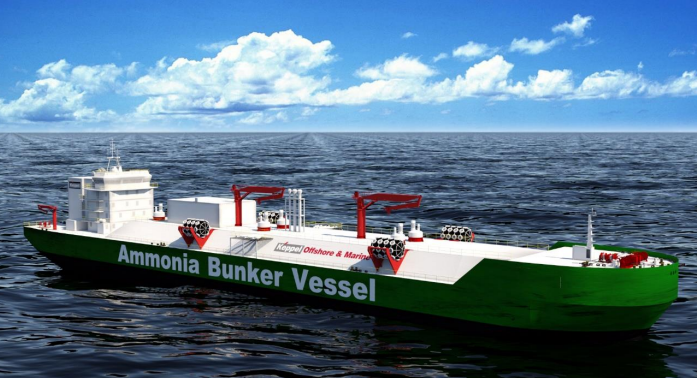There has been a rapid progress in the development of methanol and ammonia as zero-emission fuels, however, technology readiness is not enough in and of itself to drive the change needed at the pace required, a new report released by the Global Maritime Forum finds.
The report highlights that “clear action” from the International Maritime Organization (IMO) and policymakers is needed to drive wider uptake of both fuels moving forward.
The sixth edition, “From pilots to practice: Methanol and ammonia as shipping fuels”, finds that both fuels are now ‘ready’ – methanol for low-carbon operation and ammonia for piloting – representing a significant increase in maturity since the report’s first edition.
The two fuels have not been widely adopted in shipping, but are expected to have a large potential role in the sector’s decarbonization. As these fuels cannot be “dropped in” to existing infrastructure, they require the coordinated development and deployment of new land- and sea-based technologies. This means that piloting and demonstration—and the subsequent steps needed to develop a mature supply chain—are of particular importance, the Denmark-based not-for-profit organization for the global maritime industry said.
The findings focus on ships and bunkering, with fuel production developments not treated in depth. Insights are sourced from interviews with around 40 companies and organizations that have invested in methanol or ammonia assets or are involved in relevant research and demonstration projects. While the organizations interviewed represent a meaningful share of activity, their learnings may not necessarily be true for other early adopters and may change as more evidence emerges. As such, the findings should be considered a snapshot of progress in mid-2025, according to the Global Maritime Forum.
Furthermore, the report introduces a new framework for assessing the maturity of scalable zero-emission fuels, breaking down the “emergence phase” of shipping’s transition into three sub-stages:
- Proof of concept, reached once a fuel has been shown to be safe and effective in real-world demonstrations;
- Initial scale, reflecting small-scale commercial adoption of the fuel on specific routes and ports; and
- Maturity, marking the fuel’s development into a widely available solution, with limited barriers to uptake.
𝐏𝐨𝐰𝐞𝐫 𝐘𝐨𝐮𝐫 𝐁𝐫𝐚𝐧𝐝 𝐖𝐢𝐭𝐡 𝐎𝐟𝐟𝐬𝐡𝐨𝐫𝐞 𝐄𝐧𝐞𝐫𝐠𝐲 ⤵️
𝐓𝐚𝐤𝐞 𝐭𝐡𝐞 𝐬𝐩𝐨𝐭𝐥𝐢𝐠𝐡𝐭 𝐚𝐧𝐝 𝐚𝐧𝐜𝐡𝐨𝐫 𝐲𝐨𝐮𝐫 𝐛𝐫𝐚𝐧𝐝 𝐢𝐧 𝐭𝐡𝐞 𝐡𝐞𝐚𝐫𝐭 𝐨𝐟 𝐭𝐡𝐞 𝐨𝐟𝐟𝐬𝐡𝐨𝐫𝐞 𝐰𝐨𝐫𝐥𝐝!
𝐉𝐨𝐢𝐧 𝐮𝐬𝐞 𝐟𝐨𝐫 𝐛𝐢𝐠𝐠𝐞𝐫 𝐢𝐦𝐩𝐚𝐜𝐭 𝐚𝐧𝐝 𝐚𝐦𝐩𝐥𝐢𝐟𝐲 𝐲𝐨𝐮𝐫 𝐩𝐫𝐞𝐬𝐞𝐧𝐜𝐞 𝐢𝐧 𝐭𝐡𝐞 𝐡𝐞𝐚𝐫𝐭 𝐨𝐟 𝐭𝐡𝐞 𝐨𝐟𝐟𝐬𝐡𝐨𝐫𝐞 𝐞𝐧𝐞𝐫𝐠𝐲 𝐜𝐨𝐦𝐦𝐮𝐧𝐢𝐭𝐲!

